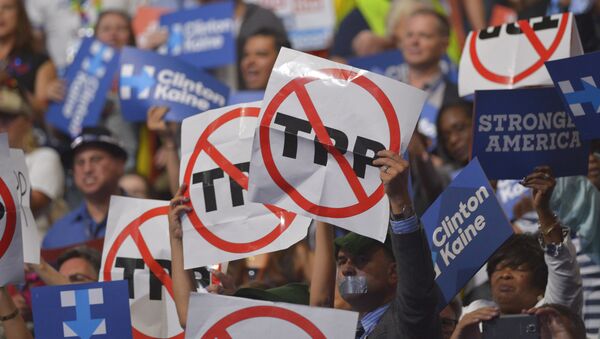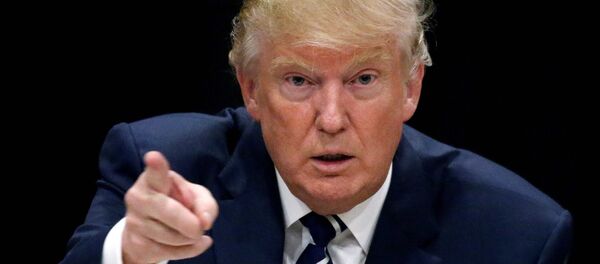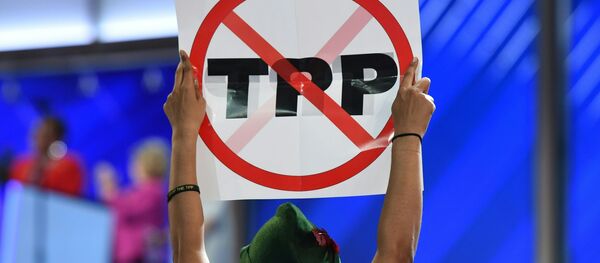Kristian Rouz – US President-elect Donald Trump announced his most urgent policy steps to be undertaken on his first day in the office on January 20, 2017, includes withdrawal from the Trans-Pacific Partnership free trade deal (TPP).
However, without the US, the TPP hardly makes as much sense as previously projected due to the massive size of the US market. Albeit the pact might still realign under mainland China’s lead, its positive effects to the economies involved would be more subtle.
On the US side of the deal, meanwhile, the prices on consumer goods and food are poised to increase according to the plans of Trump’s transition team to impose customs tariffs, boosting the revenues of domestic producers and fostering jobs creation, but affecting disposable incomes of consumers somewhat.
After Trump announced on Monday the US would pull from the proposed and nearly agreed-upon TPP, Australia and Japan were the first to react in the early hours of Tuesday, saying that they are still fully committed to strike the accord with or without the US on board.
Trump referred to the TPP as “a potential disaster for our country” due to its perceived negative effects to the US output in manufactured and agricultural goods, affecting US employment and wages. The TPP project that includes nations of the Pacific Rim from Canada to Vietnam to Chile to Singapore is supposed to eliminate the remaining trade barriers and restrictions between the signatories.
The deal, however, cannot take effect without the US among the current signatories, as the pact requires the ratification by at least six nations that represent 85pc of the combined GDP of the signatories.
"The TPP would be meaningless without the United States," the Japanese Prime Minister Shinzo Abe said.
The TPP looks pretty much dead at this point – unless other major economies of the world join the ranks of the pact signatories. Potential candidates to join include mainland China and Russia.
The Japanese parliament, meanwhile, is still discussing the possible ratification, hoping the US would change their mind. Other signatories are already seeking ways to bypass the US withdrawal and put the pact into effect without the US.
"It just continues in a state of not being in effect," Shinpei Sasaki of the Japanese Cabinet Office's TPP headquarters said. "In the future if the United States takes the procedures and it passes Congress, that would satisfy the provisions and the TPP would go into effect."
Trade Minister of Australia Steven Ciobo, however, said the nation’s cabinet is exploring the options to push the agreement toward ratification by either amending the current framework or adding new members, a more realistic case scenario. Mainland China has long expressed their dissatisfaction with the pact, which had excluded Beijing as long as it appeared to be a US-led initiative, a part of the Obama administration’s ‘pivot to the Pacific’.
"We could look at, for example, if China or Indonesia or another country wanted to join, saying, 'Yes, we open the door for them signing up to the agreement as well,'" Ciobo said.
Mainland China, however, might not be interested in joining the TPP on its terms due to the Beijing-led Regional Comprehensive Economic Partnership (RCEP) being in the works. Explicitly excluding the US, the RCEP was initially designed as a challenge and response to the Obama administration’s TPP drive. Beijing would likely to push for their own deal to take effect rather than entering the muddy waters of the faltering TPP.
Russia, meanwhile, might be the game changer. In Lima, Russian leader Vladimir Putin and Japanese PM Shinzo Abe discussed the ways to finally resolve the decades-long territorial dispute that has hampered economic cooperation between the two nations. Russia has solid chances of reinvigorating the TPP’s meaningfulness and the size of Russia’s economy could allow for the project’s ratification.
However, for the short-to-medium-term, the TPP is most likely in limbo, and a protraction long enough might result in the erosion of the sensibility of the deal.




